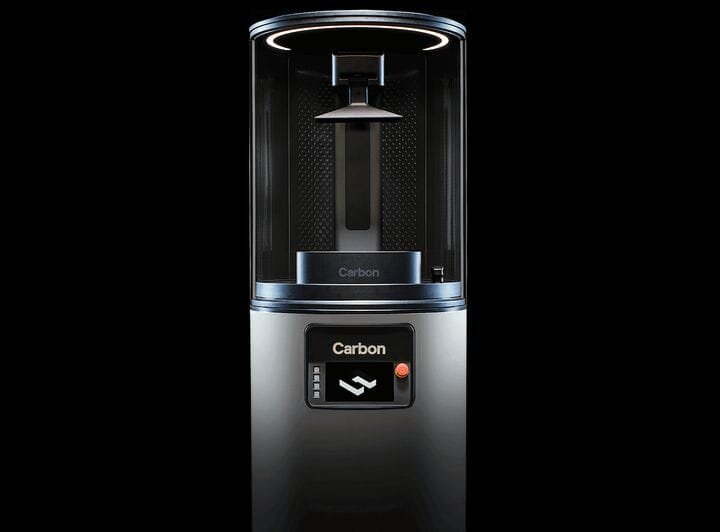![Carbon’s M2 3D printer [Source: Carbon]](https://fabbaloo.com/wp-content/uploads/2020/05/image-asset_img_5eb08dbcee4b6.jpg) Carbon’s M2 3D printer [Source: Carbon]
Carbon’s M2 3D printer [Source: Carbon]
I’m reading a press release from a manufacturing service and note that Carbon’s manufacturing strategy seems to be unfolding as designed.
The press release came from Canada-based Agile Manufacturing, which boasts of being that country’s largest 3D print service. They say:
“Agile is the largest 3D Printing Service Bureau in Canada with 28 in-house production printers ranging from Stereolithography (SLA), to Laser Sintering (SLS), Figure 4 No Contact DLP, NextDent 5100 Dental Printers, MultiJet Printing (MJP), ColorJet Printing (CJP), Direct Metal Printing (DMP), Metal X, Markforged Carbon Fiber Filaments (CFF) and Filament Deposition. With over 200,000 hours of annual Additive Manufacturing capacity (or 4.2 billion cubic inches per year) Agile is well positioned to meet your 3D Printing needs.”
As you can see, this is no small operation.
Agile Manufacturing Uses Carbon
Now they’ve struck a deal with Carbon to add Carbon’s Carbon Digital Light Synthesis equipment to their portfolio.
The deal seems to be for Carbon M2 devices and associated training, but Agile Manufacturing says they are expanding their factory floor by 6,000sf (560sm) to accommodate the new Carbon equipment’s operations. I have a suspicion you can install quite a bit of Carbon equipment in 6,000sf.
This type of arrangement seems quite in line with Carbon’s strategy. They’re goal appears to be to sell larger quantities of DLS equipment to manufacturers for purposes of medium to large-scale manufacturing. While it is possible to print prototypes on Carbon equipment, their real purpose is production.
This is a way to overcome the challenges of making arrangements with resellers, which so many other 3D printer manufacturers must do. Instead, Carbon is going directly for the production users.
Carbon Works With Direct Manufacturers
One approach Carbon has used is to work directly with manufacturers. Their work with Adidas is quite representative of this concept: Carbon developed a powerful lattice generation software tool that Adidas used to prepare their now-famous Futurecraft 3D printed midsoles.
Adidas would not have been able to develop such software themselves, but Carbon enabled them to create a product by providing this tool. In a sense, Carbon created a new market with this approach.
Manufacturing Services Use Carbon
Similarly, Carbon seems to be targeting manufacturing services. Previously they made a deal with Sculpteo, a popular 3D print service well-known in the community. Sculpteo has been successfully providing Carbon 3D prints for some time now.
The deal with Agile Manufacturing is similar; a 3D print service, or in this case a manufacturing service, now has access to Carbon technology, which they will naturally provide to their clients.
These clients will then be exposed to DLS tech by a familiar provider, bypassing the need for resellers entirely. Even better, its possible those clients might require continuous streams of DLS prints into the future, creating good revenue for both Agile Manufacturing and Carbon, who will provide the materials for all those prints.

